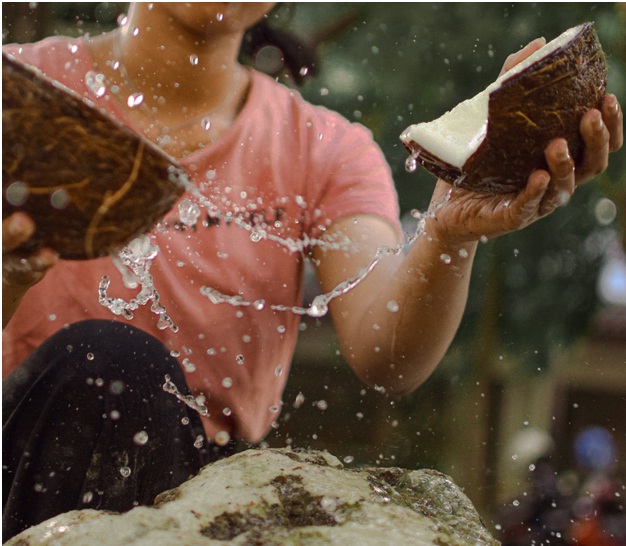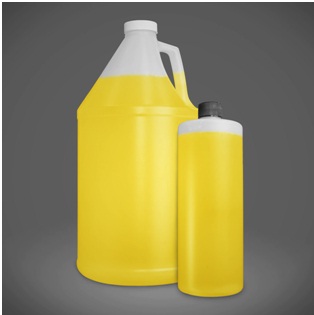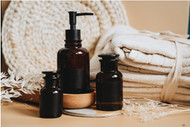How Do You Use Decyl Glucoside? The Complete Guide
Posted by MH on Jan 13th 2021
Decyl glucoside is an all-natural surfactant used in a variety of personal care products, ranging from soaps to body washes and shampoos. It is completely derived from plant-based sources, which is one of the main reasons why it is growing in usage.
For DIYers and soap-makers who are interested in using a high-quality surfactant that is gentle, mild, and creates a nice foaming action, this is the ingredient you will want to have plenty of on hand. Created from nothing but a fatty alcohol that comes from simple corn starch and coconuts, this biodegradable surfactant is becoming a useful mainstay in the production of hundreds of different kinds of self-care and home cleaning products. You can even use it to create detergents and cleaning supplies.
We’ve put together this helpful resource for anyone who wants to know how to best use this plant-based ingredient and why it’s so crucial going forward that brands pay attention to the ingredients that they use in their products. Consumers are becoming more aware of what constitutes “quality,” when it comes to what goes on their skin and what enters the environment at large, which is why plant-based products are exploding in use at the moment.
What Are Surfactants Used For?
First, it’s important to understand what surfactants are used for in general and why you need them around if you intend on regularly crafting various soaps, shampoos, and cleaning products.
Surfactants like decyl glucoside serve multiple purposes. The main reason for using them in a formula is to reduce the surface tension of water. In essence, this makes products feel more “slick” and allows you to adjust the way that a finished product behaves when you use it. If you want a product to feel a certain way or foam a certain way, you need to use a quality surfactant in the proper ratios.
There are other ways to generate certain behaviors when it comes to the foaming action of certain products, but surfactants also help in another way which makes them valuable for including in your recipes and formulas. They aid in the removal of dirt and oils. Because surfactants allow particles of cleaning substances to mix well with water, it enables the finished product to better cleanse the dirt and grime from surfaces. This is why surfactants are a primary ingredient in most cleaning products and detergents.
While many cleaning products and even many shampoos and soaps have been traditionally made using abrasive chemicals that aren’t biodegradable and may have adverse effects on your skin and hair, there is now a push toward more natural, beneficial surfactants that are mild and don’t pose as much danger to the environment. Whether you are just getting into the world of DIY soaps and cleaning products or if you run your own business and you are looking for higher-quality ingredients to rely on, it’s worth investing in the right ingredients that will meet the needs of your customers and keep nature in mind as well.
Importance of Natural Ingredients Like Decyl Glucoside
Decyl glucoside in skincare works to help alleviate dry skin, while also providing gentle foaming action to formulas. Being able to use a safe and natural ingredient like this is important because consumers are prioritizing health when it comes to the products they use on their hair and skin.
This trend has been growing over the past few years, as we are seeing more companies become health-conscious and critical of the ingredients they use in their products. Why the sudden change when traditionally, the focus was on cheap and effective ingredients?
The switch in public taste has a lot to do with the overall quality of the ingredients in question and how they interact not only with our skin but how they impact the environment at large. Many harsh chemicals, including various surfactants, are unnatural and don’t biodegrade well. This means that they remain in the environment for years and can adversely affect wildlife and even water supplies.

With increasing concern over the state of the environment and how our choices do make an impact, the spotlight has been on companies to focus on improving their formulas so that they are safer and yet still effective.
These artificial chemicals, though good at what they do, don’t satisfy the needs of many consumers any longer because they simply don’t mirror the concern for holistic living. There’s also the fact that many chemical surfactants create allergic reactions on the skin for some people, which has also ushered in a new wave of better-quality products that are gentler and have less of an impact on the world around us.
When creating a certain product, you also have to think of the end effects holistically rather than simply by whether or not it “cleans.” There are hundreds of chemicals out there that can create cleansing effects or create foaming action. The question is, how do you craft a product that does these things and that has a gentle effect on the skin and that is also safe for the environment?
This is why ingredients such as decyl glucoside have seen such buzz, especially in the EU where there has been a strong push toward environmentally friendly and eco-conscious products. What’s the point of creating a soap or shampoo that agitates the skin or that remains in the environment or that could cause harm to wildlife? When thinking about the bigger picture, it just makes sense to utilize an ingredient that is not only effective, but that is appropriate for our current global situation as well.
Another wonderful aspect of this product is that it is quite affordable as well. Corn and coconuts aren’t exactly what one would call “rare,” to say the least. This has allowed companies that would ordinarily rely on cheap chemical surfactants to switch over to a more natural ingredient without worrying about the cost. For soapmakers and anyone interested in crafting their own personal care products at home, this all-natural plant-based surfactant will not break the bank for you. It’s easy to stock up on it and use it as needed in a variety of different formulas.

What Can You Do With Decyl Glucoside?
So you have your nice environmentally-friendly surfactant, what are you going to do with it? The answer is, just about anything! This is an extremely versatile ingredient that can be used to create a wide variety of different products. This is important to note because you don’t have to switch between a variety of different surfactants in case you find yourself making several different products. You may also want to keep a little coco glucoside on hand as well, which goes well with decyl glucoside in certain recipes, but in general, you would ideally want to rely on as few ingredients as possible if you are running any kind of large operation.
According to the Cosmetics Ingredient Review, decyl glucoside is completely safe for use in just about any topical application or product, and it works well in soaps, bubble baths, body washes, detergents, and many other kinds of products. As you learn to craft your own products at home or perfect your recipes for all of your personal care items, you will want to make use of this natural surfactant often, as it has been deemed safe for all skin types and is 100% biodegradable. You really can’t expect to find a more congenial ingredient out there if you are concerned about health, wellness, and the state of the environment all in one package!
That being said, let’s take a look at a few ideas and you will see how versatile this ingredient really is.
All-Natural Body Wash or Shampoo
You will often find mild surfactants in body washes, shampoos, and similar liquid or gel personal care products. Surfactants like decyl glucoside help merge certain ingredients and improve the way the products feel when you lather them up.
Even if you haven’t created any homemade soap or other products before, you might want to gather up some ingredients from our store and create your own natural and nourishing body wash or moisturizing shampoo. It’s easier than you think, and with some of our helpful recipes, you will be crafting in no time at all.
Shampoo is another useful product that is worth learning how to make at home and that often uses similar ingredients to body washes. This surfactant helps to create the right amount of gentle foaming action and helps to not dry out your hair, as certain harmful sulfates can do, because of the way in which they strip away your natural oils.
Regardless of which kinds of products you are creating, you want to try and reduce your reliance on artificial sulfates. While they are effective (which is why they are so common), they aren’t always the best choice for your skin’s health, as well as the environment. It’s something you want to keep in mind if you are prioritizing using only products that are completely safe for your skin.
Enriching Bubblebath
Who says you can’t enjoy a nice bubble bath once you have grown up? Actually, these products are great for experimenting with various high-quality ingredients that can help nourish your skin and stimulate your senses. Along with our favorite surfactant, you can include helpful essential oils and moisturizing ingredients to create a bath-time product that is both easy to use and wholly enriching. You also won’t have to worry about it causing any harm to the environment once it goes down the drain. A total win-win!
Great For Liquid Soap
Liquid soap (and hand sanitizers) have become extremely popular for obvious reasons in light of recent events. You can use surfactants like decyl glucoside in both kinds of products, which can help create the feel you want and which will help counteract the drying properties that usually come with such products.
Liquid soap is one of those extremely useful personal care products that is worth learning how to make from scratch at home simply on the grounds that it will save you a ton of money over the long run, and because you can tailor how it smells as well. Rather than rely on whatever happens to be in stock at your local department store, you can always create the perfect aromas and sensations in your liquid soap, while making sure that the active ingredients don’t dry out your skin as well.
Facial Cleansers For Your Beauty Routine
Another use for this all-purpose surfactant is in various facial cleansers. When you need a slick and foamy product that can help pick up and wipe away dirt, this is the kind of natural ingredient you can rely on. It’s safe for sensitive areas of your skin and won’t clog your pores. Not only is crafting your own facial cleanser a money-saver, but you can also learn to adjust the formula as needed to cater to your specific skin needs, which you can’t do if you are simply purchasing a product off the shelf in a store.
Get Your Surfactants, Essential Oils, and Other Ingredients Right Here
If you are ready to jump into making your own shampoos, liquid soaps, and other products, you need to equip yourself with the right ingredients. For the best in high-quality surfactants, emollients, body butters, essential oils, and everything else you need, you can count on us to have what you are looking for.
Here at MakeYourOwn.buzz, we specialize in the finest raw and premium soap-making ingredients out there. Our selection is exhaustive, as we have just about anything you could ask for in terms of creating your own personal care items, including a great selection of safe and natural ingredients for the eco-conscious. We even have all-natural colorants like micas. We make sure that all of our products adhere to stringent qualities so that your products come out as best as possible. Visit our online store to find what you need, or call us at (888) 583-7738 if you would like more information about our products.


